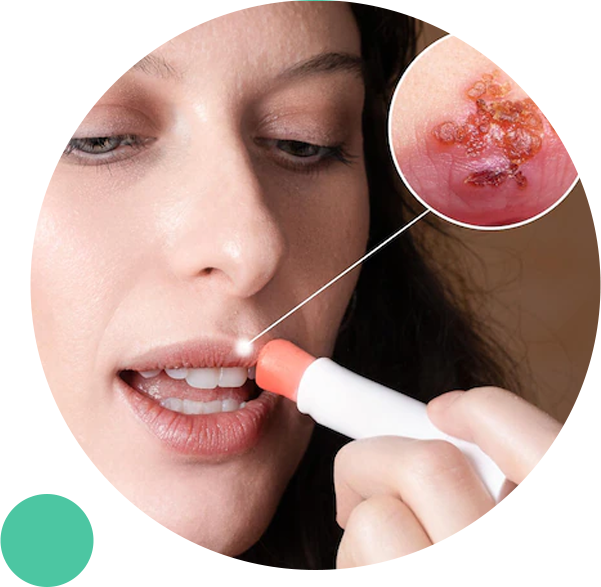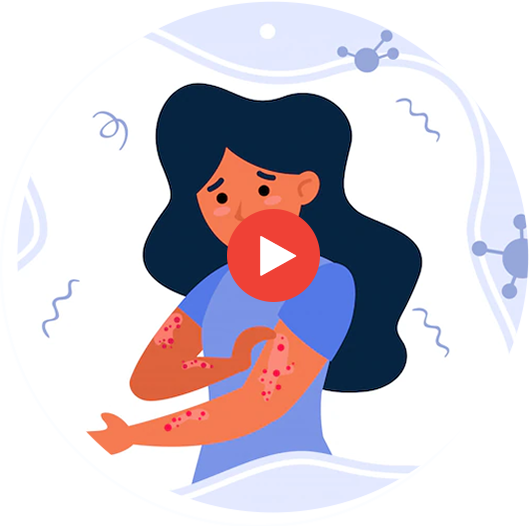

TELMDCARE
What is A
Skin Infection?
If you've ever had a skin infection, you might know that these infections are generally characterized by small, itchy, and red bumps on your skin that indicate the presence of a microorganism. These small organisms may or may not cause any discomfort to you.
Since the scope of the most common skin infections is very wide, it is difficult to know whether the condition is caused by any virus, bacteria, fungus, or parasite in your environment or body. This is why it’s important to take care of your skin so that it remains healthy and clean at all times. But before we talk about the most effective ways an online doctor for skin infections can help treat them, let’s look at the causes, signs, and symptoms of skin infections. These microorganisms often enter your body when you scratch and rub the skin for any reason, including cuts or scrapes that occur due to accidents or injuries and aging factors such as sun damage.
Book an Appointment for Only
TELMDCARE
Is covered by many popular
insurance plans

TELMDCARE
Symptoms Of Skin Infection
If you notice any of the symptoms listed above, it’s important to consult an online dermatologist for skin infection treatment online.
Risk Factors For
Skin Infections
Skin infections are fairly common, but they can be particularly unpleasant. Some people are more prone to them than others. Factors that may increase your risk of getting an infection include:
How To Prevent
Skin Infections
Cleanliness is key to preventing most types of infections. Here’s what you can do to prevent infections:
Health Complications Associated
With Skin Infections
Skin infections are one of the most common conditions requiring medical attention. They can affect any part of the body, including the scalp, mouth, genitals, and even the eyes. If you’ve been infected with a skin disease, you must consult an online doctor for skin infection.
Delaying effective treatment for skin infections can cause some serious health complications, including:
- Skin infection can leave burn marks on the skin, which can lead to scarring and discoloration. This type of scarring is known as a keloid.
- Skin infection may also cause pain, swelling, redness, and tenderness in areas where the skin is irritated. This type of irritation is known as erythema.
- Skin infections can sometimes spread to other parts of the body, especially the heart and lungs; this occurs at a high enough temperature (104 degrees F), or pyelonephritis if it occurs at a lower temperature.
- Skin infection can also lead to abscesses, boils, and cellulitis if the infection spreads deeper into the tissue (called pyoderma). If left untreated, it could lead to sepsis which is an extremely serious life-threatening condition where the blood pressure falls dramatically, causing organs to fail and stop working altogether (this is called shock).
TELMDCARE
As Seen On


TELMEDCARE
What we treat
We treat a variety of acute and chronic conditions and provide expert medical advice and guidance for our patients.
Read More
TELMDCARE
Causes Of
Skin Infection
The skin is the largest organ in the body, covering your body from head to toe. It plays a vital role in keeping you alive by protecting your internal organs, regulating your body temperature, and absorbing moisture from your surroundings. Skin infections are common and can be caused by several different factors. The most common types of skin infections include acne, boils, and cellulitis, but many others affect people differently depending on their age, gender and genetics.
The following are some of the most common causes of skin infections:
Infection with bacteria, viruses, or fungus
Bacteria, viruses, and fungal infections can infect any area of your body.
The most common types of bacteria that cause skin infections are staphylococcus aureus (staph) and group A streptococcus (gads). Bacteria can enter the skin through cuts or insect bites or when you come into contact with something unclean, such as an infected dirty towel.
Viruses can spread from one part of the body to another through contact with saliva, sweat, or mucus from someone who has had a cold or flu. Viruses that infect skin include herpes simplex virus (HSV), chickenpox virus (Varicella zoster), and Epstein-Barr virus (EBV).
Similarly, the fungus can grow in warm, moist areas such as on your feet and toes or within creases in your skin. These fungi can spread to other body parts if you don't treat them properly.

Stress
Stress can lead to an increase in cortisol levels in your body which may affect how well your immune system functions. Cortisol can also cause inflammation, leading to conditions such as eczema or psoriasis.
Injury
Any type of injury to the skin, such as burns or cuts, can lead to infection due to trauma or trauma caused by infection.
Tight clothing
Tight clothing that rubs against the skin may increase friction which causes irritation and may even lead to an infection if left untreated.
Contact with infected people or animals
Touching someone who has been recently exposed to germs may lead to an increased risk of skin infections due to cross-contamination. This is especially true for children who have very little knowledge about germs and how they spread through contact with others (and self).
Heredity
If your parents have a history of skin infections, such as eczema, you might also develop it.
Hormonal changes
Hormones like estrogen and testosterone play a role in the development of skin conditions such asacne and eczema.
Medication services available 24/7 for adults and kids (3+)
Top quality, board-certified doctors
No insurance needed
Same-day prescriptions available*
*Prescriptions provided at doctor’s discretion.
TELMDCARE
When To See A Virtual Doctor For Skin Infections
If you think you have a skin infection, it's important to see a doctor. Here are some things to consider when deciding whether or not it's time to see a virtual doctor for skin infections:
- Is the infection in an area that can be seen by others? (For example, if someone were to pass around the bacteria on their hands)
- Is the infection spreading? (If there are open sores or redness)
- Is the infection painful? (If itches and hurts)
- Does the infection spread easily? (If it looks like droplets that can spread over the body)


TELMDCARE
How To Treat
Skin Infections
If you have a skin infection, your online doctor for skin infection may recommend one of the following treatments:
Antibiotics
Oral antibiotics are taken by mouth to treat bacterial infections of the skin and soft tissues (such as muscles). The most common antibiotic for treating skin infections is clindamycin, but other oral antibiotics that may be used include erythromycin and tetracycline.These antibiotics are effective against both gram-negative and gram-positive bacteria and can help treat severe or recurrent skin infections.
Topical antibiotics are also applied to the affected area to kill any bacteria. Topical cephalexin or erythromycin is the most common topical antibiotic for cutaneous infections caused by Staphylococcus aureus and Streptococcus pyogenes.
Topical Corticosteroids
Topical corticosteroids are creams that can reduce inflammation and itching by reducing the production of chemicals (prostaglandins) that cause these symptoms. They can be applied once or twice a day. Topical corticosteroids often don't work as well as oral antibiotics for treating an acute bacterial skin infection but may be useful in treating long-lasting conditions such as acne vulgaris.
Antifungal Medications
Antifungal medications are used to treat fungal infections. They are available over-the-counter (OTC) or in prescription form. Antifungal medications work by killing the fungal infection. Some of these medicines also help relieve symptoms such as itching and burning of the skin.

Get Affordable Virtual Healthcare at TelMDCare
for Various Skin Infections
TelMDCare is a medical healthcare facility that offers affordable and high-quality patient care services for all kinds of skin infections.
For just $43, you may register today to make an appointment with doctors at TelMDCare who are highly qualified and experienced professionals and have completed their education at reputed institutions across the United States. They have years of experience treating different skin diseases, including acne, psoriasis, eczema, and more.
So what are you waiting for? Join now and let our medical professionals assist you in leading a more comfortable, pain-free, and healthy life.
TELMDCARE
FAQs Related To Skin Infection
Cleanliness is key to preventing most types of infections. Here’s what you can do to prevent infections:
The diagnosis of a skin infection is based on a physical examination, with special attention to the appearance of the skin and the presence or absence of any evidence of infection. The examination may reveal:
If you have unexplained redness, swelling, or pain where you've been exposed to germs, it's probably not a skin infection. Instead, you may have an allergy or another condition causing redness, swelling, and pain. If the problem persists after you've been exposed to something that should not have caused it and doesn't respond to treatment with an antibiotic, see our online doctor for skin infection immediately.



